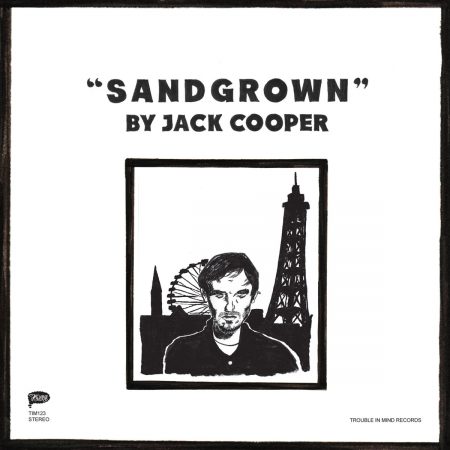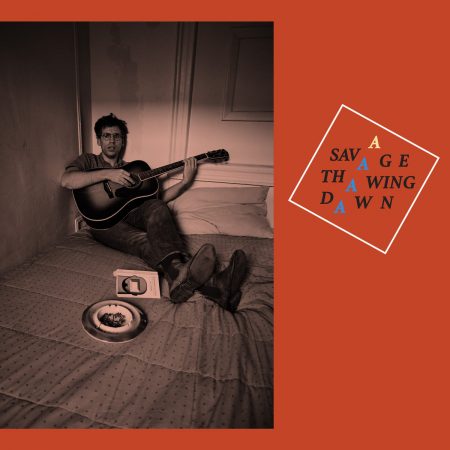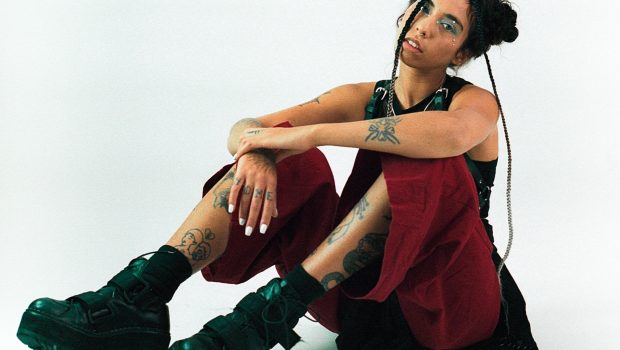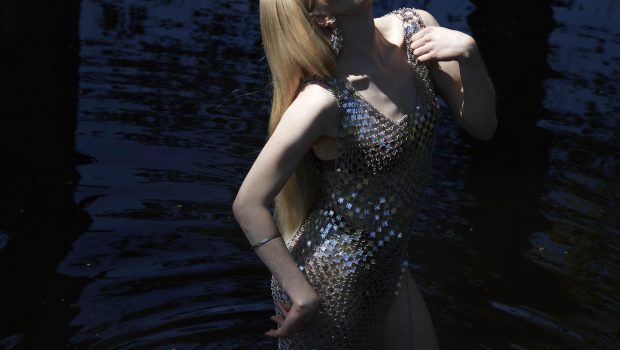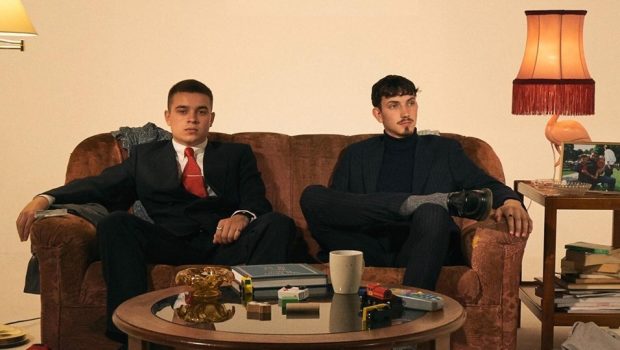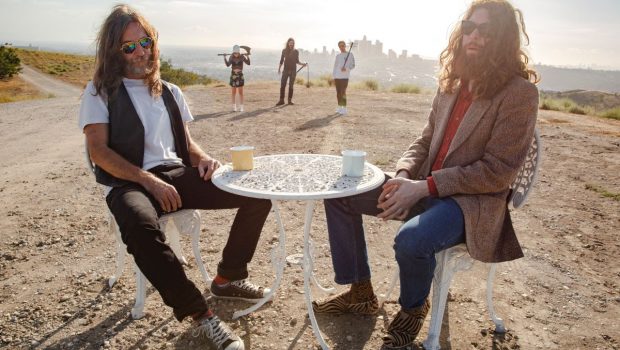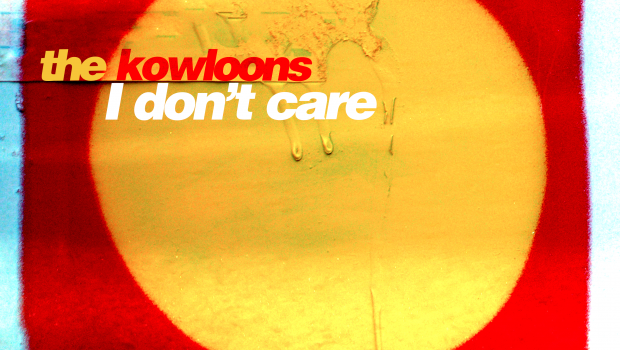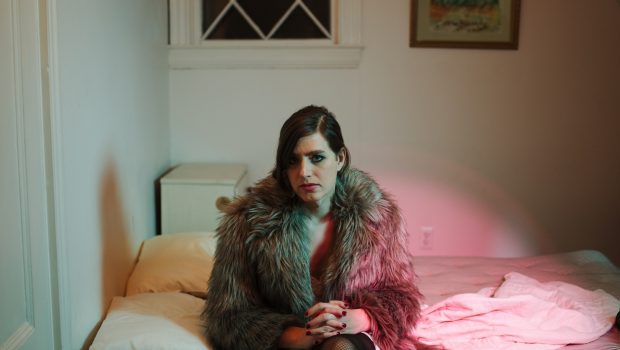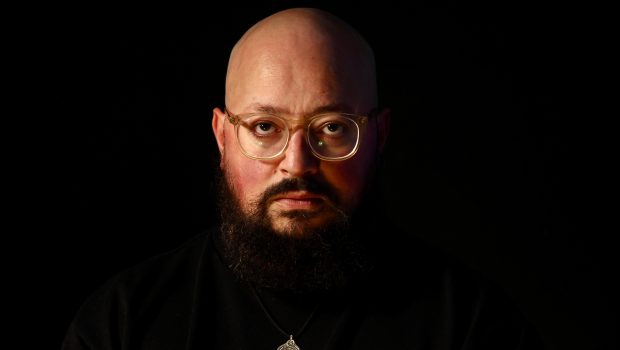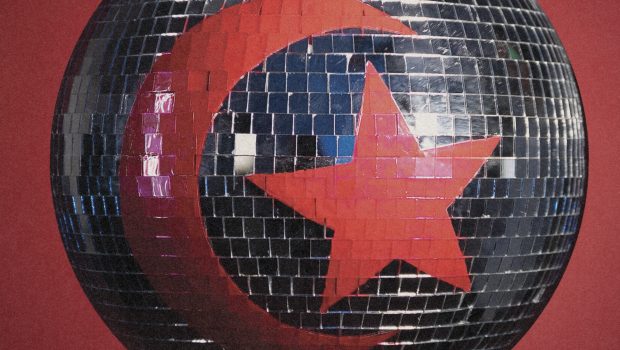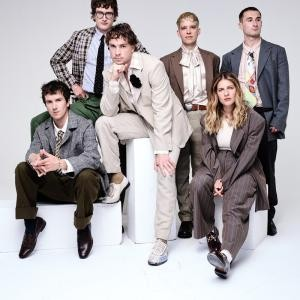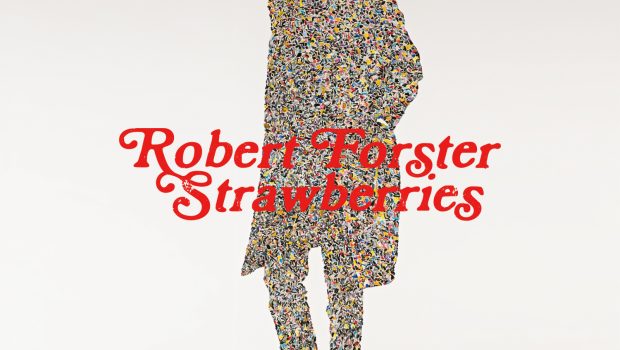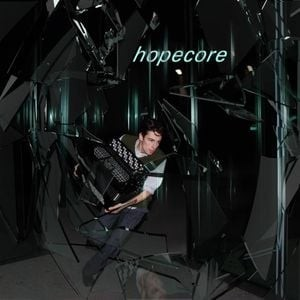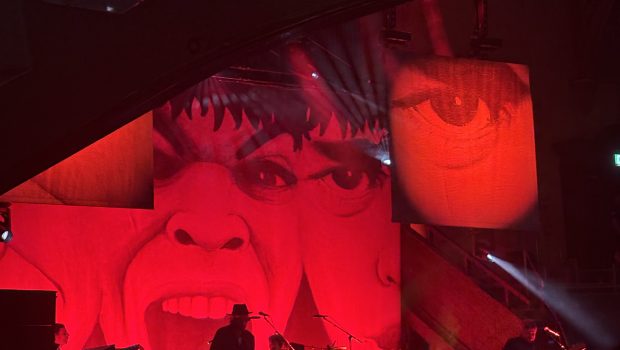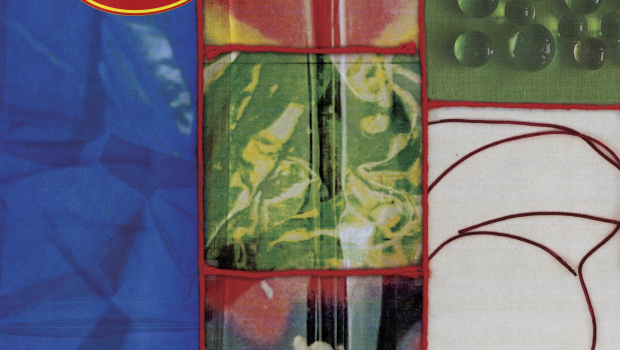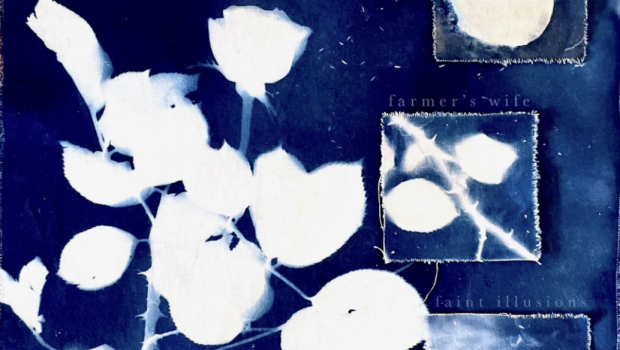-SOUP KITCHEN, MANCHESTER-
Arriving early, I dawdle at the unmanned merch stand. Jack Cooper’s debut solo record Sandgrown is for sale. The cover is black and white and carries the effect of a woodblock print. A drawing of a straight-faced Cooper with his eyes closed foregrounds the silhouettes of key Blackpool architecture, notably the tower. T-shirts are to one side, one reading, “It’s better in Blackpool…if you listen to Sandgrown”. I went on holiday there the year before the record’s release with a group of friends. Perhaps the record would have helped assuage my friend when he felt sick after drinking an amaretto milkshake and a pint in quick succession after swimming, but it was maybe only an embryo of an album then.
It begins with a schmaltzy, discrete intro, ‘Sandgrown’, title track from Jack Cooper’s debut solo record. From where I stand it looks a bit like he might be wearing a Canadian tuxedo but I’m fairly sure that’s a trick of light (under which his wristband glows neon). On further inspection it seems more likely just a variety of blue clothing, polka dotted by the stage lights. We all move forward at Andrew (or simply ‘A.’) Savage’s request, addressing the age-old issue of crowds retreating. They bookend the stage, Cooper playing a black Stratocaster, Savage a mottled brown Jazzmaster. Between them are bass player Steven J. Taveniere and drummer Aaron Neveu.
The rhythm of ‘Gynn Square’ lulls, suiting the lyrical content (“I was yawning/ It was boring”), as does the sibilance of “as the sea spray washed the weekend from the concrete”, which makes for me a humble picture of catharsis. Cooper clarifies that “all these songs are about Blackpool”. I wonder what it’s like to write about a place that has undergone such transition for over more than a century when it is also your home. In ‘Stranded Fleetwood Blues’ I notice his voice has a US tinge, layered by the soft but still punchy hum from the Hammond keyboard organ that Savage now plays, leaving a distinct seaside feeling. The songs structures feel reassuring – regular, familiar – and I sway. There’s a nice segue where the organ keeps the melody as Cooper arranges his capo. My plus one enthusiastically points out that “you can’t go wrong with a Hammond”, which might save a great many of us if true. ‘Estuary’ immediately reminds me of ‘Can’t Smile Without You’, and whilst naturally it isn’t, the intonation in the first couple of bars refers me back to it as the song plays. ‘On a Pier in the Wind’ feels calming and its refrain a gesture towards mindfulness – “don’t be anything but on a pier in the wind”. I warm to this more than permanent adjectives about the self like character traits, which is maybe the point of its guidance. On guitar again, Savage makes the Jazzmaster grind and though close I can’t see which pedal is getting airtime. The last song is gloriously titled ‘Memphis, Lancashire’ and rounds off with crescendo. Afterwards Cooper plays a few notes that have the feel of piano. The opening set feels tied up nicely, and has felt coherent throughout.
I’m almost 6 o’clock to Savage, who faces inward to the band, so his expressions aren’t clear to me. The line-up on stage remains the same, though it’s now time to play A. Savage’s solo debut, Thawing Dawn. Like the Sandgrown album sleeve, it features the artist, black and white, not quite smiling. They are not however monochrome in real life. The image on Savage’s album is more enclosed, inside a bedroom. The obvious symbols are an open book and an ashtray, though I haven’t heard him say that all his songs are about cigs and philosophy (about as universal as Blackpool is localised). The headline of Tim Scott’s September interview with Savage for Noisey declared it an album “about being on the inside of love”. This reads like a relatable feeling but for me needs more probing to get much particular meaning out of it.
They do not thaw dawn from the off. Rather, the band starts with The Fall’s ‘Frightened’. I should think Mark E. Smith has had his fair share of odes this last month in the immediate wake of his passing. The second track is the album’s opener, ‘Buffalo Calf Road’. The delivery isn’t morose although the topic matter is political, a short tale of Western greed punctured at the end by a resistance gunshot that takes American Civil and Indian Wars officer Custer off his horse (‘Buffalo Calf Road Woman/…she fired the shot to have his body removed’). The pace is steady whilst the lyrics describe two speeds intersecting, the horse and bullet crossing paths.
Shortly after, “some more organs” are asked for on behalf of Cooper, now on the Hammond. The organ, like its homonym sibling, is a pulsing source of vitality. There’s some screeching Jazzmaster as Savage checks the pedal situation, but it’s the measured low tones of ‘Wild, Wild Horses’ that proceed, one of my favourites off the record. The woodiness of the drumstick is audible as the drummer hits the rim. As if an extension of the drum’s metal edging, a reverberating metallic sound seems to circle the room like a ouija board on acid, with the help of the whammy bar. It could be terrifying if not for the cheery trundle of the bass and seaside town organ (a spillover from Sandgrown’s tone). Savage has to do a monitor check for his vocals by touching the mic close with his mouth and singing a couple of bars of ‘Dream A Little Dream’ (though he inserts “fuckin’” before the final line, plus we’re all joining in).
People chatter before the next song, which Savage tells us requires a quiet start. It’s ‘Indian Style’ and he sounds percussive as his mouth runs over the alliterative, verb-dense opening (“covers, cools and clangs”). Death emblems (“corpse”, “ghost”, “grave”) stagnate around words said and unsaid (“I texted you to say I’m sorry”, “all you’ve thought but haven’t spoken”) and images of disguise (the “abyss” with his face painted on, the “eyes” with “shades back on”) contrast with the present, meditative state to which the refrain alludes. It felt like a bit of a soliloquy when I heard it on record, complete with rhetorical question. As he says the title of the song in the chorus, I think about vocal comparisons I’ve made before about Savage: a bit of Elvis Costello, a dash of Randy Newman, probably some more – my plus one suggests Lou Reed.
The next song is ‘What Do I Do’, which I clock from the marching drumbeat. My eyes are drawn to the drummer, whose peculiar shoelaces look like stretchy spiral wires you might get on a keyring, or fusilli pasta. As if punishment for making a banal observation, the screech of the Jazzmaster cuts in. I made a note-to-self about this last night: “it’s shrill”. Savage looks like he is applying very precise pressure to the whammy bar as he bends over it. His back arcs forward in increments until he is really leaning, looking towards the back of the stage and creating feedback as he nears the amp behind him. As the chorus repeats, my mind makes the lexical leap from ‘What Do I Do?’ to Buzzcocks’ ‘What Do I Get?’. They are both songs big on repetitive grammar, though the subtle verb difference in the title makes the emphasis on the self and agency in the former more clear to me. I’m not sure what constitutes its true chorus, the words or the screech thereafter. The latter feels like a frustrated voice eking out.
As Savage faces backwards again I can read the design of his top more precisely: ‘TRUE GREG – THE ROMANTIC LOVERS ROCK BAR’. Its design fooled me when I first saw it earlier on, as I happily mistook it for Meat Free DJs’ ‘Salford Girl’s Club’ tee. I had a feeling Savage was trying to let us know he had a soft spot for Manchester. As a room we all talk (and woo) in some kind of way about Blackpool again. They are the “Thawing Dawn band”, the same who “played on record”. For the second tribute of the night, the band covers The Cranberries’ ‘Linger’, with the back of the crowd chanting the chorus as a coda. It’s easy to feel maudlin about the passing of great artists, but the spirit here feels hearty and happy.
The “clangs” in ‘Indian style’ have a cousin living in the next song, ‘Phantom Limbo’ (“did the clatter I send you ever arrive?”), maybe posted from earlier in the set. The static of the ambiguous “cemetery”/”dealership” is contrasted with the “pretty fast” speed of the (metaphoric or otherwise) road. If the sense of place in Sandgrown is certain, Savage seems at least in this song to be exploring it, both the needs we have to leave our hometowns and to reconcile with them. Homeliness passes from place to person as the addressee stirs up the feeling of “local tavern comfort”, and as he “fled [his] birthplace village” so he finds some life purpose “nestled in [their] eyes”. It’s replete with uncertainties, although it concludes on assurance (“I’m sure that you’re the sweetest breeze that’s ever blown through me”). The wind and the sea in this final chorus loop me back to specific lines and environments created by Cooper’s ‘On a Pier in the Wind’ and ‘Gynn Square’. If Savage is on some level referencing his own hometown of Denton, Texas – a lake in Texas might well have the grandeur of the whole Irish Sea – the comparison zips together two otherwise contrasting geographies. Next I notice, all three guitarists are singing together, another pleasant overlap.
At 22.04 the lights come on. They continue on all the same with the race of ‘Winter In The South’. It has a country-rock pulse, boisterous, which on record is beefed up with fragments of saxophone. The narrative voice offers curious metaphors about who they are across the refrains: flimsy/disposable objects (“screen door’s wire”/”drying flowers”/ “postcard read…”); allusions to a (fleeting) face (“bowing eye”, “pilgrim’s mouth”); shunted things that have in common belonging to no-one or someone unknown (“I’m a hotel shower”/”tempted saint”/”distant hound”).
At ten past we’re being told that they’ve gone over by ten minutes. The band are asked to finish the set, which I later realise is because a club night has been billed afterwards. Savage plays ‘Ladies From Houston’ just him and guitar, and sounds a bit like he could be Leonard Cohen singing ‘Suzanne’. There’s some gentle drum before it kicks in more sturdily and the bass comes in, followed by the Stratocaster. I’m riddled with a metallic pain and as the Jazzmaster brings some edge back in I feel like my spine is a set of strings being tensed. With the line “I’ve got a ring full of keys again”, I think how the rattling sounds complement the image, and I make the connection with what I had thought looking at the drummer’s laces. They go into the last song even if the mild curfew is overdue. It’s the title track, which I’ve already turned into a spoonerism a few times over (‘dooring thorn’). Its structure welcomes an interlude and instrumentals.
Being inside of things, mouths and eyes, the clever evocation of movement and purpose in the now and the past – mostly I’m captured by the poignancy and deftness of Savage’s lyricism. Both artists evoke place extremely well. It all feels carried by rhythmic control, the challenge in the coded lyrical imagery rather than the rest of the music. The delivery felt warm and good, and the records themselves ones to revisit, ripe for unpicking.
[NB I think someone once said words to the effect of “anything can be inferred from the art object”. On that note, take my words with a pinch of salt. I caught up with Jack Cooper to get some of his takes on the music.]
Silent Radio: Other than Blackpool, are there any particular influences on the record, musical or otherwise?
Jack Cooper: Well Blackpool isn’t so much an influence on this record… more the inspiration. I started seeing a pattern in some songs that I’d been writing and felt that some sort of concept would be inspiring. I guess musically, the primary influence were lots of early seventies singer-songwriters… Bill Fay, Joni Mitchell, Scott Walker.
SR: How does touring this record – your first solo album – compare to touring others?
JC: Well it feels remarkably easy as the band is made up of friends, so it’s really just an excuse to get together and play some music. Hopefully that attitude is infectious.
SR: What do you think made/makes you and Andrew compatible musically?
JC: I’m not sure whether we are particularly… I suppose we are. I think we’re both quite open to going with the flow and seeing where it takes us. Again though… we’re friends first and foremost.
SR: Do you have any favourite spots to play in Manchester, and if so where?
JC: I used to work behind the scenes at the Deaf Institute so I have a huge fondness for it there. Manchester seems to have a mountain of great venues and I miss that. London is somewhat lacking to be perfectly honest.
A. Savage: Bandcamp
Jack Cooper: Bandcamp | Twitter
